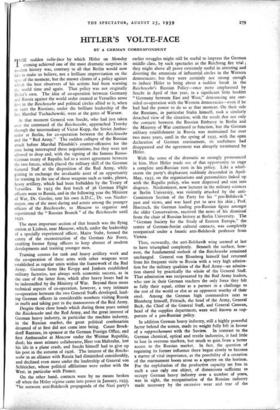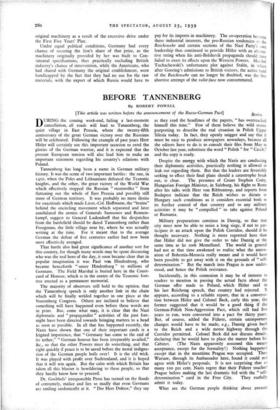HITLER'S VOLTE-FACE
BY A GERMAN CORRESPONDENT ri1l-1E sudden volte-face by which Hitler on Monday 1 evening achieved one of the most dramatic surprises in modern history was, contrary to all that Berlin would now like to make us believe, not a brilliant improvisation on the sr ur of the moment, but the master climax of a policy against which the best observers of his actions had been warning tie world time and again. That policy was not originally Hitler's own. The idea of co-operation between Germany and Russia against the world order created at Versailles arose first in the Reichswehr and political circles allied to it, when in 192o the Russians, under the brilliant leadership of the late Marshal Tuchachewski, were at the gates of Warsaw.
At that moment General von Seeckt, who had just taken over the command of the Reichswehr, approached Trotsky through the intermediary of Victor Kopp, the Soviet Ambas- sador at Berlin, for co-operation between the Reichswehr and the " Red Army." The sudden collapse of the Russian attack before Marshal Pilsudski's counter-offensive for the time being interrupted these negotiations, but they were not allowed to drop and, with the signing of the famous Russo- German treaty of Rapallo, led to a secret agreement between the two forces, which placed the military skill of the German General Staff at the disposition of the Red Army, while gaining in exchange the invaluable asset of an opportunity for training in the use of those weapons such as tanks, planes, heavy artillery, which had been forbidden by the Treaty of Versailles. In 1923 the first batch of 36 German Flight officers went to Russia, and in the following year the Minister of War, Dr. Gessler, sent his own A.D.C., Dr. von Nieder- mayer, one of the most daring and astute among the younger officers of the Reichswehr, to Moscow to organise and superintend the " Russian Branch " of the Reichswehr until 1932.
The most important section of that branch was the flying station at Ljubezi, near Moscow, which, under the leadership of a specially experienced officer, Major Stahr, formed the centre of the reconstruction of the German Air Force, enabling former flying officers to keep abreast of modern developments and training younger men.
Training centres for tank and heavy artillery work and the co-operation of these arms with other weapons were established as regular units within the framework of the Red Army. German firms like Krupp and Junkers established military factories, not always with economic success, as in the case of the latter firm, which after heavy losses had to be indemnified by the Ministry of War. Beyond these more technical aspects of co-operation, however, a very intimate co-operation between the two General Staffs developed, lead- ing German officers in considerable numbers visiting Russia in mufti and taking part in the manoeuvres of the Red Army.
Despite these close bonds which during those years united the Reichswehr and the Red Army, and the great interest of German heavy industry, in particular the machine industry, in the Russian market, the great political combination dreamed of at first did not come into being. Count Brock- dorff Rantzau, its sponsor at the German Foreign Office, and first Ambassador at Moscow under the Weimar Republic, died; his most ntimate collaborator, Herr von Maltzahn, lost his life in a plane crash, and Seeckt himself had to give up his post in the autumn of 1926. The interest of the Reichs- wehr in an alliance with Russia had diminished considerably, and declined even more under the leadership of General von Schleicher, whose political affiliations were rather with the West, in particular with France.
On the other hand, contacts were by no means broken off when the Hitler regime came into power in January, 1933. The outworn anti-Bolshevik propaganda of the Nazi party's earlier struggles might still be useful to impress the German middle class, by such spectacles as the Reichstag fire trial ; they might above all prove extremely useful in arresting and diverting the attentions of influential circles in the Western democracies; but they were certainly not strong enough to induce Hitler to bring about a sudden break in the Reichswehr's Russian Policy—once more emphasised by Seeckt in April of that year, in a significant little booklet " Germany between East and West," denouncing any one- sided co-operation with the Western democracies--even if he had had the power to do so at that moment. On their side the Russians, in particular Stalin himself, took a similarly detached view of the situation, with the result that not only the contacts between the Russian Embassy in Berlin and the Ministry of War continued to function, but the German military establishment in Russia was maintained for over two more years, until in the spring of 1935, with the open declaration of German rearmament, its usefulness had disappeared and the agreement was abruptly terminated by Hitler.
With the sense of the dramatic so strongly pronounced in him, Herr Hitler made use of that opportunity to stage a complete anti-Russian turn in his policy. Like a whirl- storm the party's displeasure suddenly descended in April- May, 1935, on the organisations and personalities linked up with the Rapallo policy, who were dispersed and sent into disgrace. Niedermayer, now lecturer in the military sciences at Berlin University, was violently attacked by the anti- Comintern Section of the Party for his " pro-Bolshevik " past and views, and was hard put to save his skin ; Prof. Hoetzsch, the German leading pro-Russian figure amongst the older Conservatives, received the news of his dismissal from the chair of Russian history at Berlin University. The " German Society for the Study of Eastern Europa," the centre of German-Soviet cultural contacts, was completely reorganised under a fanatic anti-Bolshevik professor from Vienna.
Thus, outwardly, the anti-Bolshevik wing seemed at last to have triumphed completely. Beneath the surface, how- ever, the fundamental outlook of the Reichswehr remained unchanged. General von Blomberg himself had returned from his frequent visits to Russia with a very high admira- tion for the military qualities of the Red Army—an admira- tion shared by practically the whole of the General Staff. That admiration was reciprocated by the Red Army leaders, who saw in their German teachers the only force they felt as fully their equal, either as a partner in a challenge to the rest of the world or else as an opponent worthy of their steel. Among the German high commanders next to Blomberg himself, Fritzsch, the head of the Army, General Beck, the Chief of the General Staff, and General Camran, head of the supplies department, were well known as sup- porters of a pro-Russian policy.
In addition German heavy industry, still a highly powerful factor behind the scenes, made its weight fully felt in favour of a rapprochement with the Soviets. In contrast to the German chemical, optical and textile industries, it had little to lose in overseas markets, but much to gain from a better access to the Russian market. In fact, the question of regaining its former influence there began slowly to become a matter of vital importance, as the possibility of a cessation of the rearmament boom arose as a spectre on the horizon. For the exploitation of the productive capacity set free in such a case only one object, of dimensions sufficient to occupy German heavy industry over a number of years, was in sight, the reorganisation of the Russian industry made necessary by the excessive wear and tear of the original machinery as a result of the excessive drive under the First Five Years' Plan.
Under equal political conditions, Germany had every chance of securing the lion's share of that prize, as the machinery originally provided by her was built to Con- tinental specifications, thus practically excluding British industry's chance of intervention, while the Americans, who had shared with Germany the original establishment, were handicapped by the fact that they had no use for the raw materials, with the export of which Russia would have to pay for its imports in machinery. The co-operation between these industrial interests, the pro-Russian tendencies in the Reichswehr and certain sections of the Nazi Party's own leadership thus continued to provide Hitler with an alterna- tive string when his anti-Bolshevik propaganda should have failed to exert its effects upon the Western Powers. Marshal Tuchachewski's unfortunate plot against Stalin, in which after Goering's admissions to British visitors, the active hand of the Reichswehr can no longer be doubted, was the first abortive attempt of the volte-face now consummated.









































 Previous page
Previous page